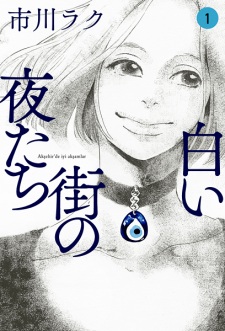Dec 22, 2021
Gönülden Gönüle Yol Vardır - There is a way that connects hearts to one another -
Shiroi Machi no Yoru-tachi (published in France as "Les Nuits d'Aksehir") is a title that could almost have its place in Harta along titles like Bride Stories, Isabella Bird or Gisele Alain. Though it takes place in a contemporary setting, it strives to make its readers want to travel and discover the beautiful country that is Turkey.
Due to a chance encounter, Ayako will come to work part-time in a small Turkish restaurant in the middle of Tokyo. As it is the main stage of the story, the traditional food
...
from there is taking a big place in it obviously; even though it is considered by some as one of the 3 great cuisines of the world with the French and Chinese, it all remains very unknown apart from the kebab.
Moussaka, tavuk Sote, Manti, raki, ekmek, meze, karniyarik, kemalpasa, meneken, kiymali, dolma, kofte… all kinds of appealing and exotic dishes, it has a very didactic approach of presenting them, detailing the cooking methods and the situations in which each meal is usually served, tidbits on their history and lots of comparisons with more well-known dishes so you're never lost on what they are.
Cooking is not the only focus here as it also revolves around other aspects of its culture: electrifying and dancing with an anatomical precision is Zakuro, organizing spectacles every night in the restaurant, there are again many different styles of dancing from the Middle East that we get to learn as well as how these styles got modernized because of the occidental influence. Her attires and accessories, used to differentiate the different styles, will play a big importance and be closely linked to Ayako as she will take great influence from her clothes for her work at the design school she's in, as well as from the elaborated motifs of the ceramics.
These elements of Turkish culture leads Ayako to get interested in their religion and to visit Tokyo's mosque, also called Tokyo Camii. This part made me a bit worried that it would turn into some sort of religious pamphlet with Ayako seemed suddenly all too ready to convert to Islam right after talking to the imam and goes a bit on a tangent about how Islam is only about love and will save everyone's soul. It's a known fact that Raku Ichikawa is a devout believer and carries a Koran at all time, I'll try to believe it's due to bad storytelling to the extent that there's some criticism of it, although very limited: it illustrates for example the contempt of Muslims on women, looking down on belly dancing because it's too sexy and provocative. It also portrays spiritual gatekeeping with the imam explaining how real believers have to listen to Koran's chanting in Arabic (but this part can be interpreted as an incentive rather than gatekeeping)
This conversion arc is also part of a larger side-story about Ayako's friend trying to commit suicide which is mostly the reason why I'm thinking more of bad storytelling as the different side-stories included in Shiroi Machi feel awkward and amateurishly written and deteriorate what could've been a simple but genuinely enjoyable slice of life. A boring one about Ayako's classmate getting jealous of her or a conflict between the restaurant owner and his wife that only gets resolved when the restaurant burns down (and it doesn't elaborate further than that)
One could regret it doesn't really broach the topic of actual history of the country or its traditions but Raku Ichikawa moved to Turkey after finishing this manga and wrote a 2 volumes autobiographical manga called "Watashi, Ima Toruko desu" which has more nuance and carefully explains her everyday life there, her status as an immigrant and as a woman, weddings, the lifestyle of Turkish people and comments on terrorist acts commited there and especially on the 2016 coup d'état.
Shiroi Machi no Yoru-tachi shines by the entrancing oriental atmosphere and should be read by anyone who would want to learn a bit more about Turkey but is hindered by exploitative sidestories around suicide, jealousy and religious preachings.
Reviewer’s Rating: 6
What did you think of this review?
Nice
 0
0
Love it
 0
0
Funny
 0
0
Confusing
 0
0
Well-written
 0
0
Creative
 0
0Show all



















